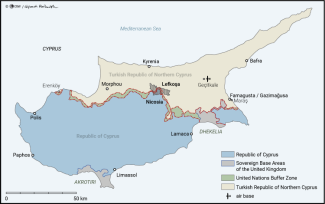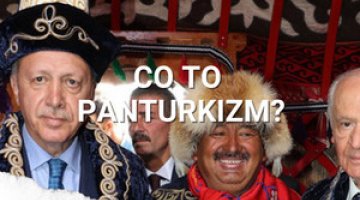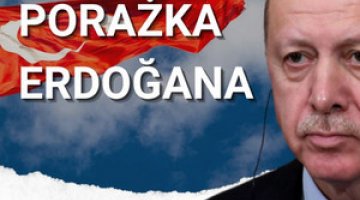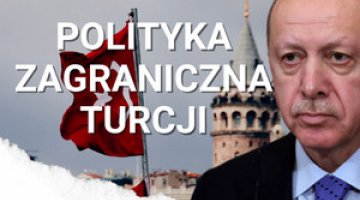A drifting island: Ankara on changes in the so-called Turkish Republic of Northern Cyprus
On 19 October, Tufan Erhürman was elected president of the internationally unrecognised so-called Turkish Republic of Northern Cyprus (TRNC) with a decisive majority of 62.8% of the vote. Erhürman is an advocate of resuming reunification talks with the Republic of Cyprus on the basis of a federal model. His main rival, the Ankara-backed incumbent Ersin Tatar, received 35.8% of the vote. During his five-year term, Tatar’s policies significantly strengthened Turkey’s position on the island, as he consistently promoted the two-state solution that is likewise championed by Ankara.
Erhürman’s proposed return to peace negotiations based on a federal model will not be possible without the involvement of Turkey, the only state that recognises the TRNC and supports the position of the Turkish Cypriots in the talks. The parastate is politically, economically and, in terms of security, dependent on Ankara. Should negotiations on a federal formula resume, a new window of opportunity would open to resolve the Cyprus conflict. However, another breakdown in such talks would likely strengthen the determination of the TRNC and its citizens – as well as that of Turkey – to pursue a two-state solution and intensify efforts to secure international recognition.
From federation to a two-state solution
Cyprus remains divided between the internationally recognised Republic of Cyprus, an EU member state, and the so-called Turkish Republic of Northern Cyprus (TRNC) (for a detailed explanation of the so-called Cyprus question, see ‘Cypr w polityce Turcji’). The TRNC is dependent on Turkey in every respect – political, financial, and military – and even for its supply of drinking water, which is delivered via an undersea pipeline more than 100 –kilometres long. The Turkish lira is the official currency in the parastate, and most consumer goods are imported to the occupied northern part of Cyprus from Turkey. In 2025 alone, Ankara supported the budget of Lefkoşa (North Nicosia) with a grant of approximately US$450 million and an additional US$48 million in loans. Approximately 40,000 Turkish troops are also stationed in the northern part of the island.
For years, attempts to reunify the island under United Nations auspices have yielded no results. The UN framework envisages the creation of a ‘bizonal, bicommunal federation’. The last round of formal negotiations collapsed in 2017, with both sides refusing to continue the talks. The TRNC delegation was led by then president Mustafa Akıncı, who devoted his entire political capital to pursuing a federal settlement. In 2020, Ersin Tatar assumed the presidency of the TRNC, coming to power amid widespread frustration over the failure of the peace process and growing sentiment that it was both unproductive and outdated. His election campaign was marked by unprecedented involvement from figures within Turkey’s ruling political camp.
Tatar’s presidency contributed to the consolidation of Ankara’s influence in the northern part of the island. The former president belongs to the National Unity Party (UBP), considered a ‘sister party’ to Turkey’s ruling Justice and Development Party (AKP). He was an advocate of maintaining two independent, ethnically based states on the island – a stance supported by Turkey, which in 2021 officially declared the two-state solution to be its policy regarding the so-called Cyprus issue. During Tatar’s tenure, informal peace talks were held under UN auspices; however, the TRNC continued to insist on the two-state solution. Meanwhile, the foreign ministries of both the TRNC and Turkey consistently criticised subsequent extensions of the mandate of the United Nations Peacekeeping Force in Cyprus (UNFICYP).
The existence of the TRNC is pivotal to Turkey’s regional strategy, as it enables Ankara to anchor its influence in the Eastern Mediterranean basin. Turkey challenges the existing boundaries of exclusive economic zones (EEZs) and remains in dispute over them with both Greece and the Republic of Cyprus. This conflict was further intensified by the discovery of substantial natural gas deposits in the region’s waters in the early 21st century. The resolution of the so-called Cyprus issue also remains a major point of contention in Turkey’s relations with the European Union. As the Republic of Cyprus is an EU member state, the entire island is, in formal terms, part of the EU’s territory, whereas the TRNC constitutes EU territory in which EU law is temporarily suspended.
A breakthrough election?
Erhürman’s victory came as a surprise to Ankara, which had made considerable efforts to secure an outcome favourable to its interests. During the election campaign, Turkish politicians from the AKP, including Vice-President Cevdet Yılmaz, visited the island and urged voters to support Tatar. According to media reports in Northern Cyprus, Tatar’s campaign team also received financial and organisational assistance from Turkey.
Erhürman, a former prime minister of the TRNC, represents the staunch opposition to Tatar. He is a member of the Republican Turkish Party (CTP), which maintains ties with Turkey’s main opposition force, the Republican People’s Party (CHP). The politician advocates a return to UN-mediated peace talks and supports the formula proposed by the organisation – namely, the federalisation of the TRNC and the Republic of Cyprus. As preconditions for resuming negotiations, he insists on equality between the TRNC and the Republic of Cyprus in the talks, acceptance of a system of rotating presidency, a clearly defined timetable, and the settlement of issues concerning property taken over by Turkish Cypriots. He also demands that there be no return to the status quo in the event of failure. These stipulations are intended to increase pressure on Nicosia, implying that the talks would represent a ‘last-chance’ opportunity. The president-elect further emphasises that a peace agreement will not be achievable without cooperation with Ankara.
Erhürman’s election was driven largely by public dissatisfaction with the stark disparity in living standards between the northern and southern parts of the island, as well as with Ankara’s growing interference in Lefkoşa’s internal affairs, including moral issues and the education system. Earlier this year, controversy erupted in the largely secular TRNC society over legislation permitting the wearing of Muslim headscarves in secondary schools. In addition, recent years have witnessed a series of assassinations linked to illegal businesses operating within the parastate. The lack of international recognition has turned the TRNC into a ‘grey zone’, where activities that are either illegal or strictly regulated in Turkey – such as gambling, prostitution, or surrogacy – are able to flourish. The TRNC has also become a hub for money laundering and a transit point for drug and human trafficking. Groups profiting from these activities oppose the reunification of the island.
The election outcome was formally recognised by President Recep Tayyip Erdoğan, who congratulated the CTP candidate on his victory. In contrast, Devlet Bahçeli, leader of the Nationalist Movement Party (MHP) – a coalition partner in Turkey’s government – questioned the legitimacy of the result and called on the Turkish parliament to adopt, without delay, a resolution on the annexation of the TRNC by Turkey. His statement, however, elicited no response, as Ankara is fully aware of the serious international repercussions such a move would entail, potentially jeopardising its relations with both Washington and Brussels. Across the Turkish political spectrum, there remains a broad consensus on maintaining close relations with the TRNC.
Last chance for a federation?
As Erhürman himself has emphasised, a return to peace negotiations will not be possible without Ankara’s cooperation, as Turkey has the capacity to obstruct any prospects for an agreement. Meanwhile, given its existential dependence on Turkey, the TRNC cannot afford to distance itself from it. At the same time, Erhürman’s election may represent the last opportunity to revive dialogue with the Republic of Cyprus based on a federal model. Over time, as Turkey’s influence in the TRNC continues to strengthen, the current status quo – and with it Ankara’s drive towards a two-state solution – is likely to become further entrenched.
Erhürman’s victory will serve as a test of the TRNC’s political autonomy. In the past, the unrecognised republic was governed by figures and parties not aligned with Turkey’s ruling AKP, and over the years a degree of internal autonomy developed. However, this arrangement may now come under pressure, with Ankara potentially increasing its interference in Lefkoşa’s domestic politics. Turkish media – across the political spectrum – have portrayed the TRNC elections as an extension of Turkey’s own internal political polarisation. Over the past year, Ankara has intensified its repression of the opposition (for more, see ‘Awaiting a verdict. Turkish opposition under pressure’), while the ruling coalition has focused on consolidating power. In this context, Bahçeli’s remarks were interpreted as a signal of Turkey’s growing determination to ensure that the TRNC remains governed by figures loyal to the ruling camp in Ankara. In addition, Erhürman’s presidency may also face difficulties arising from cohabitation: the parliament remains dominated by the National Unity Party (UBP), aligned with former president Tatar. The next parliamentary election is not scheduled until 2027.
Turkey, which continues to promote a two-state solution, will remain committed to broadening the scope of international recognition for the TRNC. It was owing to Ankara’s diplomatic efforts that, in 2022, the TRNC obtained observer status in the Organisation of Turkic States (OTS), with President Tatar regularly participating in its summits thereafter. However, this ‘Turkic’ strategy for securing recognition of the TRNC’s statehood faces certain limitations. During the EU–Central Asia summit in April 2025 (see ‘EU–Central Asia summit in Samarkand: the economy comes first’) Kazakhstan, Uzbekistan, and Turkmenistan reaffirmed their support for two UN Security Council resolutions declaring all secessionist actions, and the TRNC’s declaration of independence, to be illegal. Ankara did not respond to these statements, and the TRNC’s continued presence in Turkic integration formats was maintained. Erhürman’s potential participation in future OTS forums may serve as an indicator of the relationship between Ankara and Lefkoşa.
Turkey, however, may also turn the proposal to resume negotiations to its own advantage. In such a case, it could present itself as a constructive actor while anticipating another collapse of the talks. The failure of the negotiations could shift the preferences of the TRNC’s inhabitants towards a two-state solution and eliminate the prospects for any further attempts to resolve the conflict on the basis of a federal model.
Map. So-called Turkish Republic of Northern Cyprus and the Republic of Cyprus

Source: ‘Cyprus Map’, United Nations, Department of Public Information, Cartographic Section, October 1997, un.org.





